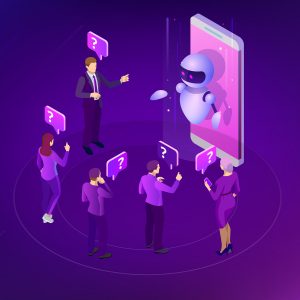Estimated reading time: 3 minutes
In the the current workplace climate, many organization have experienced a huge surge in the need for call center operators. From users seeking out account information or requesting a walk-through in navigating their mobile banking app, there is a need for that advisor on the other end.  Most users harbor a sense of comfort, with knowing that there is a human agent at the other end of the line. It makes the experience a bit more personalized and cuts back on any robot-phobias. The current times will show that many call center companies are transitioning over to employing smart-bots and AI-generated customer service representatives.
Most users harbor a sense of comfort, with knowing that there is a human agent at the other end of the line. It makes the experience a bit more personalized and cuts back on any robot-phobias. The current times will show that many call center companies are transitioning over to employing smart-bots and AI-generated customer service representatives.
The Next Generation for Call Centers
The use of AI is becoming more widespread and voice & text-based solutions are becoming the norm. Call centers tend to face many fraudsters and individuals posing as faulty tax or immigration officials, that can steal identities and important financial information. Chatbots and virtual agents are doing their part in reducing agent burdens overall.  Virtual Customer Agents (Chatbots) are formatted with a human-like face and the personality to answer specific questions, assist with problem cases, and recommend additional resources. With this skillset in tow, they can alleviate pain points for call center employees, but it’s vital to know that these bots aren’t replacing the humans on the front line.
Virtual Customer Agents (Chatbots) are formatted with a human-like face and the personality to answer specific questions, assist with problem cases, and recommend additional resources. With this skillset in tow, they can alleviate pain points for call center employees, but it’s vital to know that these bots aren’t replacing the humans on the front line.
Is a Call Center Chatbot Right for You?
These AI agents are most impactful in service-heavy industries, like financial groups, retail, travel, and telecommunications. A transcript that would typically live in a call center works to generate massive amounts of data that work to train the AI-powered agent. This data contains thousands of scenarios that train AI to learn how to conquer challenges as they arise on the job. Even with very little data, AI is still able to figure out the issue and develop the smarts to do so swimmingly.
If you’re completely on board for this customer service benefit, you’ll likely have to wait awhile. Unless you plan on spending millions of dollars on customer service efforts, then it’s unlikely the development effort will make enough of an impact to pay off in the long run.
Consider your Channels
Facebook gets a lot of recognition these days, because many businesses have simplified chatbots added to their social media platforms. They do this to make sure they stay responsive within their community, and remain a reliable resource. To be specific, there are over 300,000 chatbots on Facebook providing valuable responses to consumer questions.
 Though these social media chatbots seem to pose at problem-solvers, they can also create several issues. Authentication is tough when running an application on someone else’s platform. Privacy and data security are also defined challenges within installing chatbots into one’s business plan. Retailers often feel wary of allowing their main communication platform to be social media, due to the fears of eves-dropping taking place.
Though these social media chatbots seem to pose at problem-solvers, they can also create several issues. Authentication is tough when running an application on someone else’s platform. Privacy and data security are also defined challenges within installing chatbots into one’s business plan. Retailers often feel wary of allowing their main communication platform to be social media, due to the fears of eves-dropping taking place.
AI in the Call Center
AI harbors the potential to transform the power of consumer engagement. Though call centers are typically inhabited by human call agents, customers are searching for a faster, more frictionless experience to receive information they are seeking. Knowing when to implement AI in call centers is critical. AI is a tool that employees can use to help maintain collaborative engagement between the customer relationship, operations, and IT actions. AI in call centers is likely becoming inevitable, as time goes on. It’s predicted that by 2022, a huge transformation will occur in the way human agents are employed at call centers. Human employees will get ushered onto more meaningful tasks that require a more personality and brain power .

